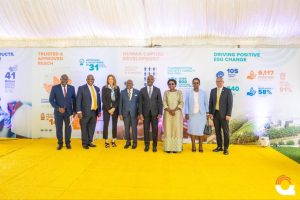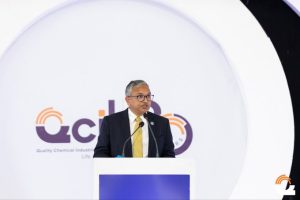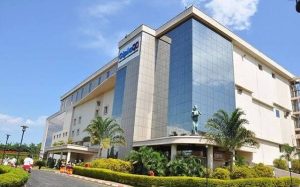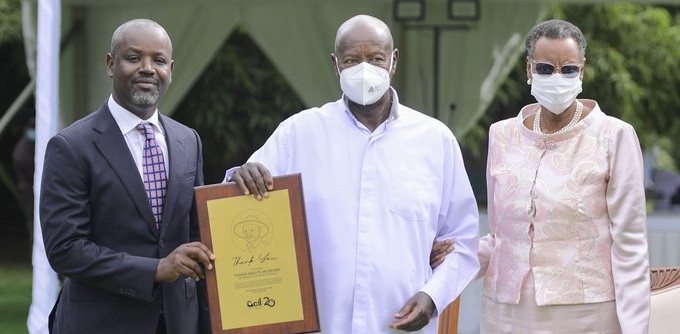President Yoweri Kaguta Museveni has called on Ugandan scientists to intensify research into the medicinal potential of local herbs and natural plants, urging collaboration between experts and pharmaceutical companies to validate and commercialise herbal remedies for both domestic and global markets.
In remarks delivered on his behalf by the Deputy Speaker of Parliament, Rt Hon. Thomas Tayebwa, during Quality Chemical Industries Limited (QCIL)’s 20th anniversary and groundbreaking ceremony for a new factory in Luzira, the President highlighted Uganda’s immense biodiversity as a foundation for natural medicine innovation.
“I want to see companies like QCIL partner with Ugandan researchers, universities, and traditional practitioners to develop and commercialise scientifically validated herbal medicine,” President Museveni stated. “This will not only diversify our pharmaceutical base but also strengthen Uganda’s position as a global leader in natural medicine innovation.”

The President praised QCIL as a model of industrial success and a driving force behind import substitution and public health improvement.
“QCIL stands as a premier model for import substitution and industrialisation. For too long, our country has been immersed in goods and raw materials from abroad. It’s a model we must replicate across other sectors—through agro-processing, textiles, and machinery—to build a resilient economy,” he said.
“QCIL’s role in disease burden reduction is not just a business achievement but a public health victory, meaning our people can live longer, healthier, and more productive lives.”

Expansion and Launch of Paediatric ARVs
The event marked QCIL’s 20 years of pharmaceutical excellence and the groundbreaking of a new state-of-the-art manufacturing facility at the Luzira Industrial Park. The new factory will expand annual production capacity from 1.4 billion to 2.4 billion tablets and introduce new production lines for tuberculosis (TB) treatments—currently not manufactured anywhere on the continent.
Health Minister Dr Jane Ruth Aceng commended QCIL for its sustained investment in local manufacturing and innovation, particularly in paediatric HIV treatment.

“As the Ministry of Health, we celebrate this milestone with QCIL,” she said. “The expansion of QCIL to manufacture more pharmaceutical products moves us toward self-reliance, timely availability, and quality of products, and most importantly, Africa’s independence.”
She further lauded QCIL’s launch of a new paediatric HIV formulation—a combination of Abacavir, Dolutegravir, and Lamivudine—saying it ensures that children can take their medication safely and consistently.
“Launching paediatric ARVs is another big milestone in our history,” Dr Aceng added. “Children are always forgotten. Even when the outbreak of HIV was first announced, the world focused on adults, and children came later. Today, we are happy that we can prevent mother-to-child transmission and treat our children.”

Dr Aceng also reflected on lessons from the COVID-19 pandemic, which she said underscored the importance of local capacity building.
“During COVID-19, we experienced profound discrimination that sent a clear message: do it yourself. African solutions for African problems,” she emphasised.
She revealed that Uganda is finalising the National Drug and Health Products Authority Bill to ensure that locally manufactured products meet international standards. “Currently, Uganda is working on this Bill to ensure that whatever we manufacture in Uganda is acceptable internationally. This represents a higher level of regulation,” she said.
Strengthening Africa’s Pharmaceutical Capacity
QCIL Chairman and Co-Founder, Mr Emmanuel Katongole, said the new facility will enable the company to scale production and expand into new therapeutic areas.

“This investment will enable QCIL to scale annual manufacturing capacity from 1.4 billion to 2.4 billion tablets while introducing specialised production lines for TB treatments, injectable medicines, and other innovative products,” he said. “We are strengthening our capacity to serve Uganda and the wider African market with high-quality, affordable medicines while reducing dependency on imported drugs.”
QCIL CEO, Mr Ajay Kumar Pal, added that the new factory represents a significant investment in Africa’s healthcare future.
“For the last 20 years, QCIL has been producing quality, affordable medicines, and the results have been remarkable. This new chapter represents a significant investment in our mission to expand access to critical medicines by manufacturing in Africa, for Africa,” he said. “The new factory will make QCIL the only manufacturer of TB medicines in the region.”

Celebrating 20 Years of Impact
As part of the anniversary celebrations, QCIL also commissioned a new Quality Control Laboratory equipped with advanced instrumentation capable of performing over 4,000 tests per month.
“The Quality Control Laboratory has been a game-changer for QCIL, strengthening our ability to maintain the highest standards of quality across every medicine we produce,” said Mr Ajay. “Our new paediatric HIV/AIDS medicine ensures that children can take their treatment safely and consistently, enabling them to live long, healthy, and productive lives.”
Government Support and Recognition
Deputy Speaker Thomas Tayebwa, representing the President as Guest of Honour, commended QCIL for advancing Uganda’s pharmaceutical self-sufficiency and contributing to regional health security.

“I thank you for advancing Uganda’s pharmaceutical self-sufficiency and contributing to regional health security through sustained domestic manufacturing of quality and affordable medicines that our people rely on for their very survival,” he said.
QCIL, established in 2005, has evolved into Sub-Saharan Africa’s largest producer of WHO-prequalified HIV/AIDS and malaria treatments. It currently supplies 31 African countries and employs over 580 staff. Over the years, more than 900 interns and graduate trainees have benefited from its training programs, positioning QCIL as a regional hub for pharmaceutical excellence.











